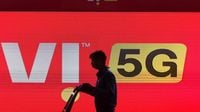Vodafone Idea Ltd. has recently made headlines following the Indian government's decision to convert ₹36,950 crore of the company's outstanding spectrum dues into equity, a move that will significantly alter the landscape of the struggling telecommunications operator. The stock surged dramatically by 20% on April 1, 2025, reaching ₹8.17 on the Bombay Stock Exchange (BSE), marking a crucial moment for the company as it faces ongoing financial challenges.
The government's stake in Vodafone Idea will increase from 22.6% to approximately 48.99% as a result of this conversion. This change not only positions the government as the single-largest shareholder but also means that the combined stakes of Vodafone Plc and the Aditya Birla Group, the company's private promoters, will be eclipsed. Following the equity conversion, Vodafone's stake will decrease from 24.4% to 16.1%, while Aditya Birla Group's stake will fall from around 14% to 9.4%.
According to Motilal Oswal analyst Aditya Bansal, the government's increased stake could potentially lead to Vodafone Idea being classified as a public sector unit (PSU) if the stake crosses the 50% threshold. This conversion, priced at ₹10 per share—a 47% premium to the stock's last closing price—has been seen as a timely intervention by the government to support the beleaguered telecom operator.
Citi analyst Saurabh Handa described this move as a significant display of support by the government, which is expected to provide substantial cash flow relief to Vodafone Idea over the next three years. The conversion will reduce the company’s overall net debt by 18%, with projections indicating that its spectrum dues could decrease from ₹110 billion to ₹5 billion by FY26. This relief is vital as Vodafone Idea prepares for increased regulatory payments following the expiration of a moratorium in September 2025.
Despite the positive news surrounding the equity conversion, Vodafone Idea still faces considerable financial hurdles. The company is required to settle ₹29,000 crore in spectrum and adjusted gross revenue (AGR) dues in the latter half of FY26. However, with the conversion, these obligations are expected to drop to ₹11,000 crore, and starting FY27, annual payments will reduce significantly from ₹43,000 crore to ₹17,000 crore.
Vodafone Idea's cash reserves stood at ₹12,090 crore at the end of the December quarter, but analysts warn that this may not be sufficient to cover ongoing capital expenditures alongside AGR dues repayments. The firm has been operating at a loss and will need to stabilize its subscriber base while seeking further relief measures from the government to ensure its long-term survival.
Analysts from various firms have weighed in on the implications of the government’s decision. Citi has maintained a buy rating on Vodafone Idea, setting a target price of ₹12 per share, which reflects a potential increase of 76% from the last closing price. However, Macquarie has taken a more cautious approach, retaining a neutral call with a target price of ₹7. Motilal Oswal has also raised its target price from ₹5 to ₹6.5, highlighting the high-risk, high-reward nature of the stock.
Nomura has adjusted its target price down from ₹12 to ₹10, citing a 4% reduction in FY25-27 EBITDA estimates due to anticipated lower subscriber numbers and increased network operating expenses. The firm predicts an average revenue per user (ARPU) growth of 13% for FY26-27, with ARPUs expected to reach ₹200 by FY27.
In recent months, Vodafone Idea has launched its 5G services in Mumbai and plans to expand this coverage across India. This expansion is crucial as the company aims to regain lost subscribers and compete with rivals that boast superior cash flow generation and financial stability. Despite the government’s support, analysts believe that Vodafone Idea's future hinges on successfully closing its debt raise and investing in network improvements.
Retail investor sentiment remains a point of interest as Vodafone Idea prepares to disclose its March quarter shareholding data. The number of retail shareholders surged from 36.18 lakh at the end of March 2024 to 58.34 lakh by the end of the year, indicating a growing interest in the stock despite its volatility.
As of now, the stock's performance has been lackluster, with a 15% decrease since the beginning of the year and a staggering 48% decline over the past 12 months. The average target price set by analysts stands at ₹8, suggesting an 18% potential increase from current values, although the prevailing recommendation among 22 analysts is to 'Sell'. The stock's relative strength index (RSI) is at 35.7, indicating neutral market conditions, while the MACD reading of -0.3 signals bearish momentum.
In summary, Vodafone Idea's recent equity conversion marks a pivotal moment for the company, providing much-needed financial relief and altering the ownership dynamics significantly. However, the road ahead remains fraught with challenges as the company seeks to stabilize its operations and regain market confidence amidst a highly competitive telecommunications landscape.







